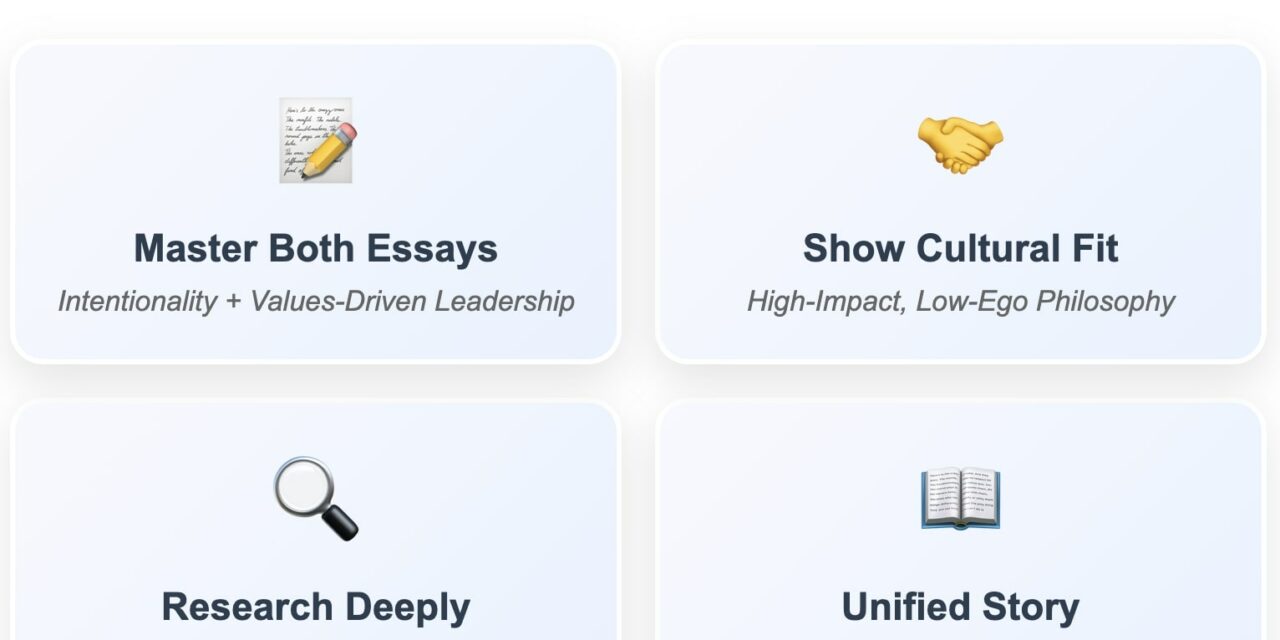The Kellogg School of Management MBA application is more than just paperwork—it’s your chance to tell a compelling story that sets you apart from thousands of equally talented candidates. With acceptance rates hovering around 20%, your essays aren’t just important; they’re absolutely critical to your admission success.
What makes Kellogg’s application particularly unique is its multi-faceted approach. You’ll craft two substantial written essays, complete several short-answer prompts, and tackle a timed video essay component. This comprehensive evaluation gives you multiple opportunities to showcase different aspects of your personality, but it also means every component must work together harmoniously.
As Kellogg’s admissions team puts it: “there are no perfect answers to our essay questions.” Instead, they’re looking for authenticity, intentionality, and evidence that you’ll both thrive in and contribute to their collaborative community. The stakes are high, but with the right strategy, you can transform these essays from obstacles into your strongest application assets.
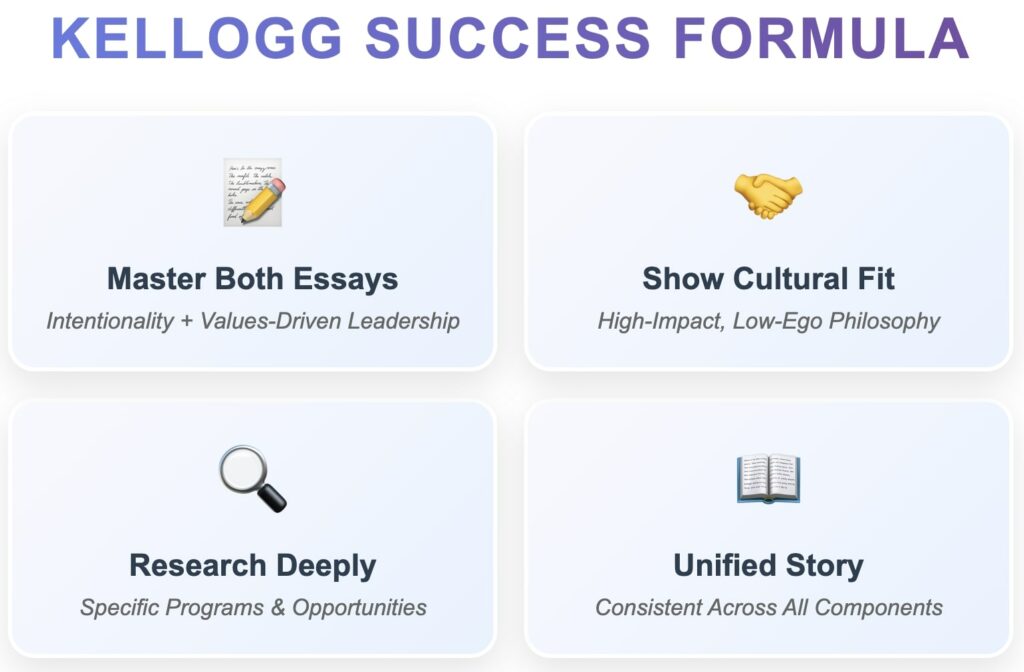
- Decoding Kellogg’s Current Essay Requirements and Prompts
- Aligning Your Story with Kellogg’s Values and Culture
- Strategic Essay Positioning for Admission Success
- Learning Key Success Strategies: Three Profile Deep Dives
- Conclusion: Your Kellogg Journey Starts Now
- Frequently Asked Questions About Kellogg MBA Program
⭐Strengthen Your GMAT Score for Kellogg
While essays humanize your application, a strong GMAT score opens doors. Get your FREE Personalized Study Plan and discover the optimal path to your target score in just 10 minutes.
Decoding Kellogg’s Current Essay Requirements and Prompts
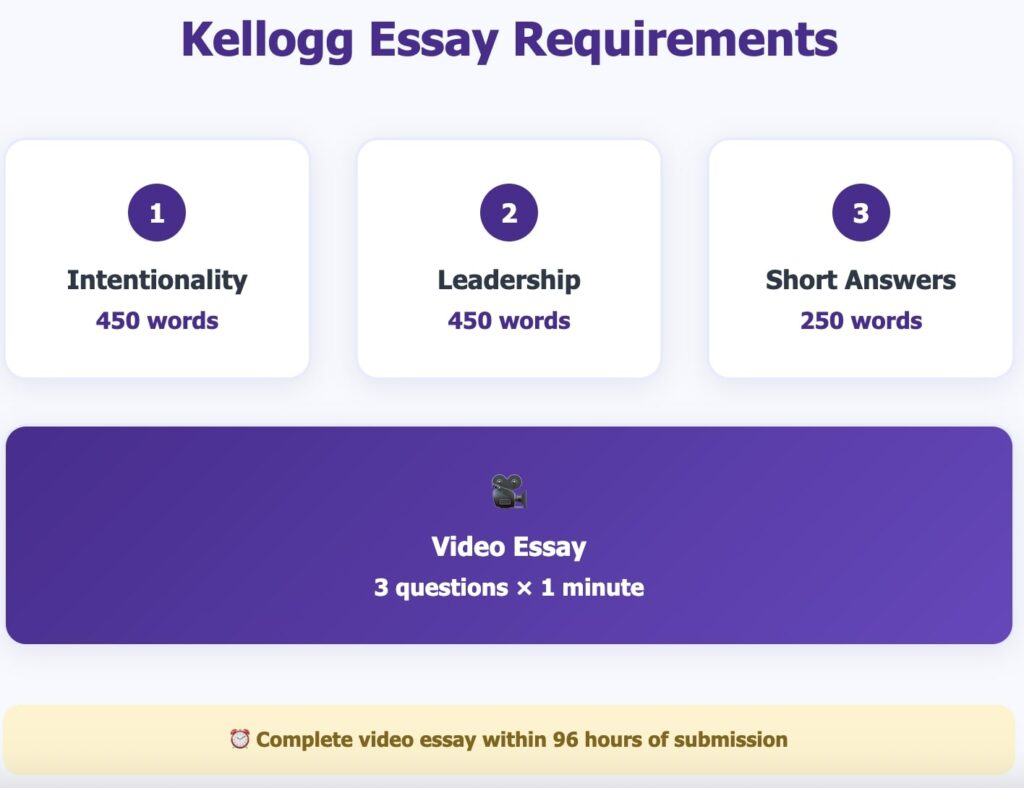
The Two Required Written Essays
Essay 1 – 450 words: The Intentionality Essay
“Intentionality is a key aspect of what makes our graduates successful Kellogg leaders. Help us understand your journey by articulating your motivations for pursuing an MBA, the specific goals you aim to achieve, and why you believe now is the right moment. Moreover, share why you feel Kellogg is best suited to serve as a catalyst for your career aspirations and what you will contribute to our community of lifelong learners during your time here.”
This isn’t just a “Why MBA?” essay—it’s a comprehensive examination of your strategic thinking and self-awareness. Kellogg wants to see five key elements:
| What They Want to See | Common Pitfalls to Avoid |
| ⭐ Your specific career goals (both short-term and long-term) | ❌ Addressing only part of the multi-layered question |
| ❓ Why you need an MBA to achieve these goals | ⛔ Giving generic reasons for choosing Kellogg (“It’s a top-ranked school”) |
| ⏱ Why now is the right time for this step | ⚠️ Focusing too heavily on past achievements rather than future aspirations |
| ➡️ Why Kellogg specifically aligns with your aspirations | ❌ Failing to articulate specific contributions you’ll make to the community |
| ✅ What unique value you’ll bring to their community | ⚠️ Writing about “why MBA” without connecting it to clear career goals |
Strategic Approach: Break this essay into five distinct but interconnected sections. Start with your career vision, explain why an MBA is essential for achieving it, justify your timing, demonstrate specific knowledge of Kellogg’s offerings, and conclude with concrete ways you’ll enrich the community.
⚡ Know Where You Stand Before Applying
Just as Kellogg essays require precision, so does your GMAT strategy. Take our FREE adaptive mock test to get an accurate score prediction and identify exactly what to improve.
Essay 2 – 450 words: The Values-Driven Leadership Essay
“Kellogg leaders are primed to tackle challenges everywhere, from the boardroom to their neighborhoods. Describe a specific professional experience where you had to make a difficult decision. Reflecting on this experience, identify the values that guided your decision-making process and how it impacted your leadership style.”
This prompt evaluates your leadership under pressure and the ethical compass that guides your decisions. Kellogg isn’t looking for perfect outcomes—they want to understand your thought process and personal growth.
| Key Components | What Makes a Decision “Difficult” |
| ⚠️ A genuinely difficult professional decision (with real stakes and no obvious right answer) | ⚙️ Competing priorities or stakeholder interests |
| ⭐ Clear articulation of the values that influenced your choice | ❗ Ethical dilemmas or moral complexity |
| ↗️ Honest reflection on how this experience shaped your leadership approach | ⚡ High-stakes situations with significant consequences |
| ✅ Evidence of personal growth and learning | ➡️ Decisions requiring you to take an unpopular stand |
Strategic Framework: Use the STAR method (Situation, Task, Action, Result) with heavy emphasis on the “Action” (your decision-making process) and “Result/Reflection” (what you learned). Remember to explicitly name the values that guided you—integrity, fairness, innovation, teamwork—and connect them to your future leadership aspirations.
Short-Answer Questions and Specialized Prompts
| Essay Type | Requirements |
| ⚙️ Specialized Program Essays | If applying to One-Year MBA, MMM, MBAi, or joint-degree programs, you’ll need an additional 250-word essay explaining your fit. Requires deep research into program nuances and clear connections between your background and the program’s unique features |
| ➡️ Reapplicant Essay (250 words) | Previous applicants must address: “How have you grown or changed personally and professionally since you previously applied, and what steps have you taken to become the strongest candidate you can be?” |
| ℹ️ Optional “Additional Information” Section (250 words) | Use only for necessary explanations—employment gaps, academic inconsistencies, or unusual circumstances. Admissions team’s advice: “less is more.” Don’t use as another essay; use for context and clarification only |
The Video Essay Component
Within 96 hours of submitting your application, you’ll complete a video essay with three prompts, each requiring a 1-minute response with minimal preparation time. Recent prompts have included:
- Introduction question: “Introduce yourself to the admissions committee”
- Goals question: “What path are you interested in pursuing and why is Kellogg right for you?”
- Behavioral question: “Tell us about a time you faced a challenge and what you learned”
Success Strategies:
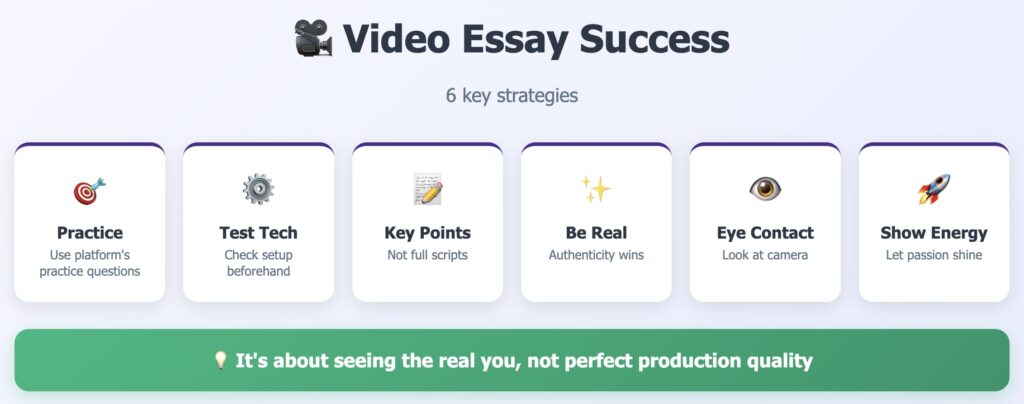
The video isn’t about production quality—it’s about seeing the person behind your carefully crafted written essays. Let your genuine passion for Kellogg and your goals shine through.
Aligning Your Story with Kellogg’s Values and Culture
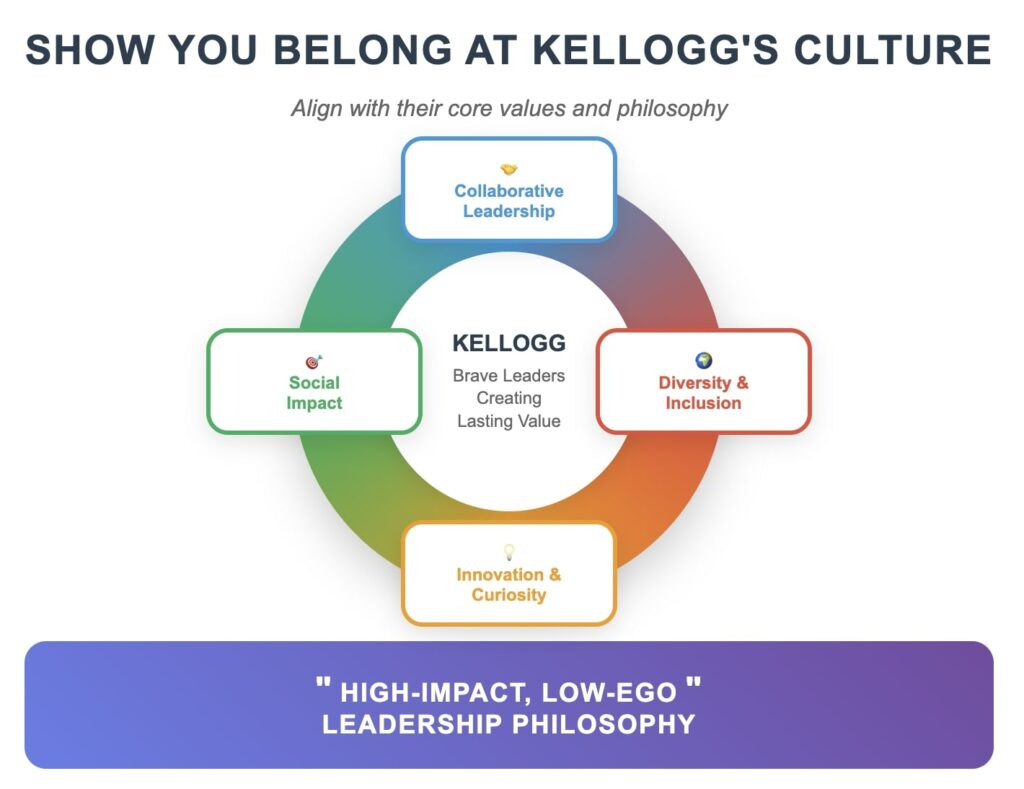
Understanding Kellogg’s Core Mission
Kellogg’s mission centers on educating “brave leaders who create lasting value.” But what does this mean for your application? The school seeks candidates who embody four key characteristics:
1. Analytical and Interpersonal Balance
You’re not just a numbers person or just a people person—you blend quantitative rigor with emotional intelligence. In your essays, showcase experiences where you’ve used both data-driven analysis and relationship-building skills to achieve results.
⭐ Demonstrate Your Analytical Skills
Kellogg values candidates who blend analytical and interpersonal skills and GMAT is one of the strongest measurable indication of these qualities. Strengthen your GMAT prep with our comprehensive FREE resources:
- 15+ hours of GMAT Focus video lessons
- 400+ practice questions with detailed solutions
- AI-driven personalized learning tools
2. Innovation and Curiosity
Kellogg values forward-thinking leaders who challenge the status quo. Highlight experiences where you’ve introduced new ideas, adapted to change, or approached problems with creative solutions.
3. Collaborative Leadership
This is perhaps Kellogg’s strongest cultural marker. The school’s “high-impact, low-ego” leadership philosophy means demonstrating that you can lead effectively while working well with others. Share examples of cross-functional teamwork, mentoring, or consensus-building.
4. Diversity and Inclusion
Kellogg champions leaders who not only come from diverse backgrounds but actively leverage and appreciate diversity. This could mean seeking different perspectives, contributing to inclusive environments, or having a global mindset.
Mapping Kellogg’s Unique Offerings to Your Goals
Program Diversity
Kellogg offers six distinct full-time MBA pathways. If you’re targeting a specialized program like the MBAi (AI/Data Science) or MMM (Design Innovation), demonstrate clear alignment between your background and the program’s unique curriculum.
Academic Excellence
With seven majors and ten specialized pathways, Kellogg allows significant customization. Reference specific courses or faculty members that align with your interests. For example, if you’re interested in marketing, mention Kellogg’s legendary marketing faculty or the annual Marketing Summit.
Experiential Learning
Kellogg’s hands-on learning opportunities are distinctive. The Venture Lab connects students with VC firms, the Asset Management Practicum manages real endowment funds, and the Board Fellows Program places students on nonprofit boards. Identify which programs align with your goals and mention them specifically.
Global Perspective
The Global Initiatives in Management (GIM) program has operated for over 30 years, offering intensive international experiences. Kellogg also maintains exchange partnerships with 20+ schools across six continents. If you have global career aspirations, these programs provide compelling “Why Kellogg” content.
Student-Led Culture
With over 100 student clubs and major conferences organized entirely by students, Kellogg offers unparalleled leadership opportunities. Identify clubs relevant to your interests—whether it’s the Healthcare Club, Africa Business Club, or Pride@Kellogg—and articulate how you’ll contribute.
Strategic Essay Positioning for Admission Success
Creating a Cohesive Narrative
Your application should tell one unified story across all components. This doesn’t mean repeating the same information—it means ensuring every piece reinforces the same core themes about who you are and where you’re headed.
Consistency Check:
- Do your career goals align across essays, short answers, and video responses?
- Are the personal qualities you highlight complementary rather than contradictory?
- Does each component add a new dimension to your story without creating confusion?
Strategic Differentiation: Use each application component strategically:
- Essay 1: Future-focused goals and Kellogg fit
- Essay 2: Past leadership experience and values
- Video Essay: Personality and additional perspectives
- Short Answers: Program-specific fit or growth narrative
- Resume: Comprehensive achievement record
Addressing Potential Weaknesses
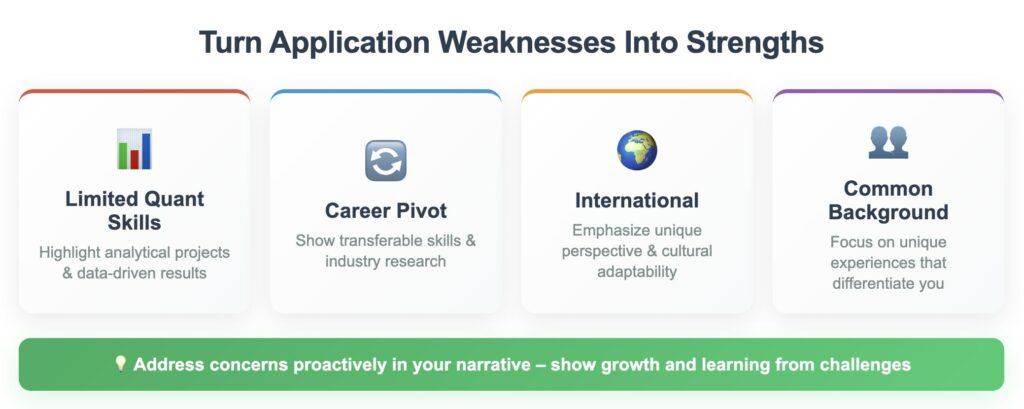
Every candidate has areas of concern—whether it’s limited work experience, a non-traditional background, or gaps in their profile. The key is addressing these proactively within your narrative.
Common Concerns and Solutions:
- Limited quantitative background: Highlight analytical projects, additional coursework, or data-driven results in your current role
- Career change: Demonstrate transferable skills and show you’ve researched your target industry thoroughly
- International applicant: Emphasize unique perspectives while showing cultural adaptability and English proficiency
- Overrepresented demographic: Focus on unique aspects of your experience and perspective that differentiate you
The Power of Specificity
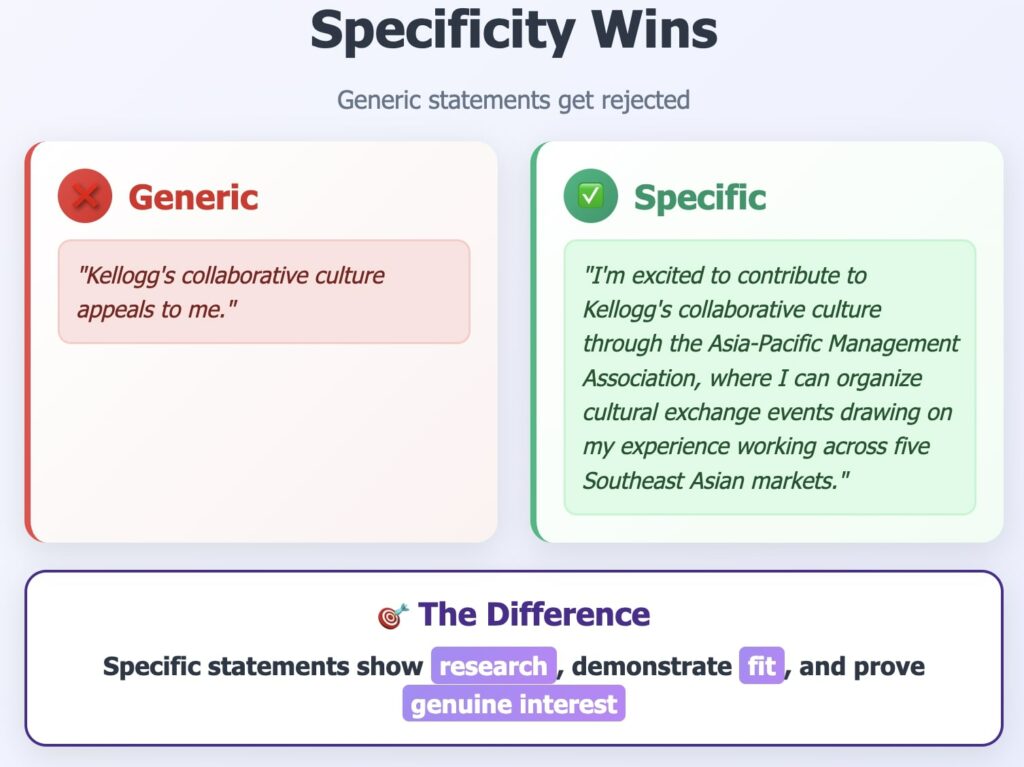
Generic applications don’t get admitted to top MBA programs. Every statement about Kellogg should be specific and researched. Instead of saying “Kellogg’s collaborative culture appeals to me,” write “I’m excited to contribute to Kellogg’s collaborative culture through the Asia-Pacific Management Association, where I can organize cultural exchange events drawing on my experience working across five Southeast Asian markets.”
Learning Key Success Strategies: Three Profile Deep Dives
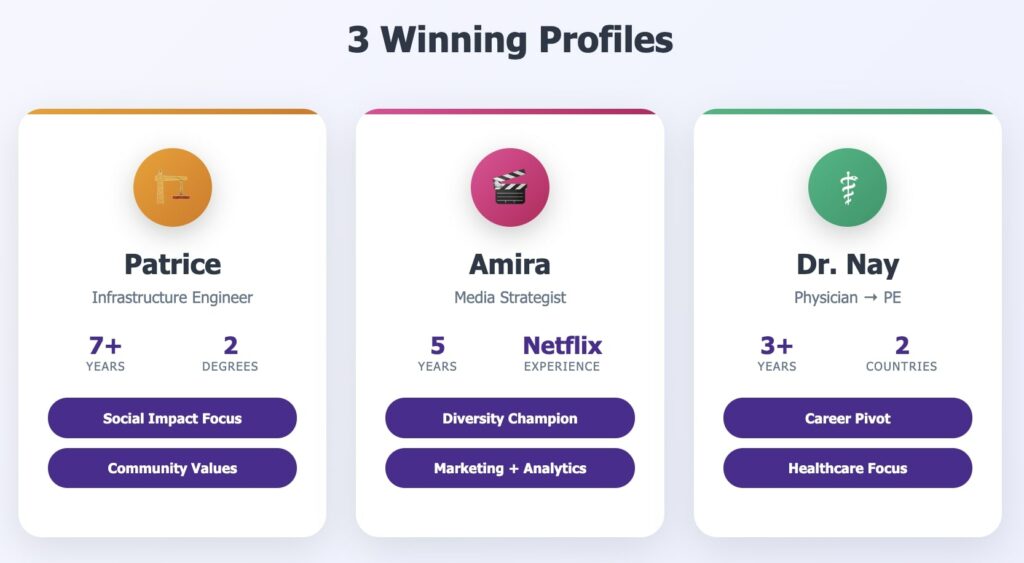
Let’s examine how three different successful applicants approached their Kellogg essays, drawing insights you can apply to your own application.
Profile 1: Patrice – The Infrastructure Innovator
Background: Cameroonian engineer with 7+ years leading infrastructure projects across Central Africa, dual degrees in civil engineering and law, aspiring to launch infrastructure development ventures in emerging markets.
Essay 1 Strategy: Patrice opened with a compelling narrative about how poor infrastructure limited economic opportunity in his hometown, establishing his personal mission. He articulated specific goals: short-term transition to infrastructure finance at an international development institution, long-term launch of his own public-private partnership venture for African transportation networks.
For “Why Kellogg,” he emphasized:
- Social Impact pathway and Net Impact Club alignment with his mission
- Global Initiatives in Management for cross-regional learning
- Africa Business Club leadership opportunities
- Kellogg’s “high-impact, low-ego” leadership philosophy matching his “salt of the community” values
Essay 2 Focus: Patrice described a construction project where he faced pressure to cut safety corners to meet deadlines. Guided by values of integrity and responsibility for community safety, he chose to halt work for proper reinforcement despite executive pushback. This experience reinforced his principle-driven leadership style and commitment to long-term community benefit over short-term gains.
➡️ Key Takeaway: Patrice succeeded by connecting his personal mission to Kellogg’s social impact focus while demonstrating specific knowledge of school resources. His values-driven leadership story perfectly aligned with Kellogg’s culture.
Profile 2: Amira – The Media & Inclusion Champion
Background: Harvard sociology graduate with 5 years in media strategy, most recently at Netflix developing content metrics, goal to become a media executive championing diverse content creation.
Essay 1 Strategy: Amira crafted a narrative about rarely seeing characters like herself in childhood media, inspiring her mission to change entertainment representation. She positioned an MBA as necessary for moving from content strategy to investment decision-making roles.
For “Why Kellogg,” she highlighted:
- Marketing major and analytics focus aligning with her content metrics experience
- Media & Entertainment Club and industry treks
- Diversity and inclusion initiatives matching her advocacy work
- Collaborative culture supporting her team-oriented approach
Essay 2 Focus: Amira described advocating for an unconventional children’s show featuring underrepresented characters despite internal skepticism. Guided by values of inclusivity and courage, she staked her professional reputation on the project. The experience taught her how to build alliances for change and reinforced her commitment to using business for social impact.
➡️ Key Takeaway: Amira leveraged her unique industry background while connecting to Kellogg’s marketing strengths and diversity values. She demonstrated how her social impact goals aligned with business success.
Profile 3: Dr. Nay – The Physician-Investor
Background: Burmese medical doctor with 3+ years clinical experience in Myanmar and UK, goal to transition to healthcare private equity to improve emerging market healthcare delivery.
Essay 1 Strategy: Dr. Nay opened with experiences treating patients who couldn’t access needed care due to resource constraints, realizing that systemic healthcare problems required financial solutions. He articulated goals to join healthcare-focused investment firms and eventually launch funds for underserved markets.
For “Why Kellogg,” he emphasized:
- Healthcare pathway and Health Enterprise Management program
- Private Equity Lab for hands-on investment experience
- Pride@Kellogg and Southeast Asia Club for community contribution
- Collaborative culture translating from medical teamwork to deal-making
Essay 2 Focus: Dr. Nay described a triage situation with limited resources requiring difficult patient prioritization decisions. Guided by medical ethics and utilitarian values, he made a principled choice while consulting colleagues. This experience taught him to stay calm under pressure and take responsibility for difficult decisions—skills essential for investment leadership.
➡️ Key Takeaway: Dr. Nay successfully positioned his career pivot by highlighting transferable skills (analytical thinking, high-pressure decision-making) while demonstrating specific knowledge of Kellogg’s healthcare and finance resources.
Common Success Factors
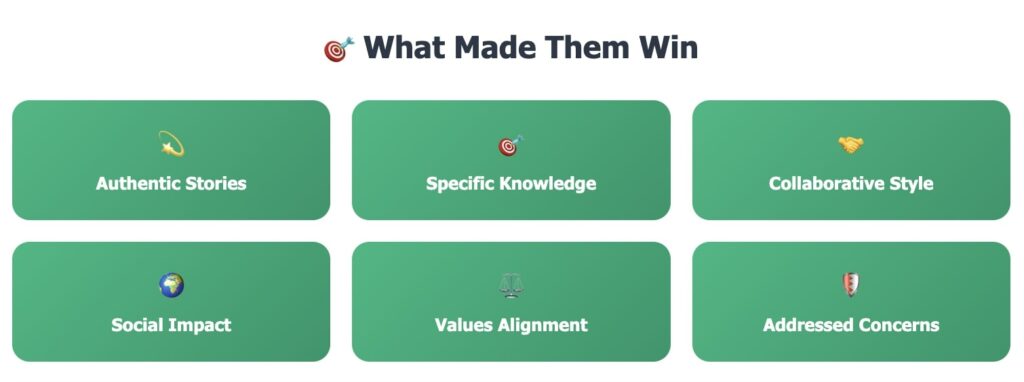
⭐ Ready to Build Your Own Success Story?
Just like Patrice leveraged his unique background for Kellogg, you can optimize your GMAT performance for your target schools. Our FREE adaptive mock test provides the same detailed analytics that helped thousands of successful applicants.
Conclusion: Your Kellogg Journey Starts Now
Remember that Kellogg accepts diverse candidates with varied backgrounds and goals. You don’t need to fit a perfect mold—you need to authentically represent yourself while demonstrating fit with Kellogg’s community and culture.
The essay writing process itself is valuable. It forces you to reflect deeply on your experiences, clarify your goals, and articulate your value proposition. These insights will serve you well not just in your application, but throughout your MBA experience and career.
Start early, write multiple drafts, and seek feedback from trusted advisors who know you well. The investment in crafting compelling essays will pay dividends in your admission chances and your future success at Kellogg.
The Kellogg community is waiting for the unique perspective and contributions only you can bring. Your essays are your invitation to join them—make them count.
⭐ Ready to Start Your MBA Journey?
You have the essay strategy – now get everything you need for GMAT success:
FREE Comprehensive Prep Package:
- ✓ Personalized Study Plan (Worth $500+)
- ✓ Adaptive Mock Tests with detailed analytics
- ✓ 15+ hours of expert video lessons
- ✓ 400+ practice questions with solutions
- ✓ AI-powered learning tools
Join thousands who’ve already started their journey to top MBA programs.
Frequently Asked Questions About Kellogg MBA Program
A Kellogg MBA’s annual tuition is $83,610 for the 2024-2025 academic year. The total cost of attendance reaches approximately $125,191 per year when including living expenses, books, travel, and other fees. For the complete 2-year program, expect total costs around $221,316, while the 1-year MBA costs approximately $122,878.
The breakdown includes room and board ($17,100), books ($1,647), travel ($1,329), personal expenses ($3,150), health insurance ($4,386), and additional fees. Financial aid is available, with 62% of students receiving support through merit-based scholarships, need-based aid, or loans. Federal loan rates for graduate students are currently 8.08%.
No, Kellogg is not technically Ivy League, but it holds equal or superior prestige in the business school world. The Ivy League is an athletic conference of 8 northeastern schools, while Kellogg belongs to the “M7” (Magnificent Seven) – the most elite MBA programs globally. Only 4% of MBA students in the US attend M7 schools, which include Harvard, Stanford, Wharton, Kellogg, Columbia, Chicago Booth, and MIT Sloan.
Kellogg’s elite status is demonstrated by its current rankings: #1 in Poets&Quants composite ranking (2024-2025), #2 in US News & World Report, #3 in Bloomberg Businessweek, and #6 in Financial Times Global MBA.
Yes, Kellogg is highly selective and competitive, consistently ranking among the top M7 business schools with rigorous admission standards. Applications increased 23% for the Class of 2026, intensifying competition. The academic profile is demanding, with average GMAT scores of 733 and GPA of 3.7. Successful candidates typically have 62 months (5+ years) of work experience.
The admissions process uses holistic evaluation, emphasizing leadership, teamwork, and cultural fit rather than just test scores. Kellogg shows strong preference for collaborative, empathetic leaders who align with their team-based culture. The school evaluates academic excellence, professional achievements, leadership potential, and cultural alignment.
Kellogg’s most recent acceptance rate for the Class of 2025 was 31-33%. The 2-year program admits approximately 524 students per class (Class of 2026).
Like several top business schools, Kellogg has become less transparent about releasing exact acceptance rates recently, focusing more on class profile data instead of specific admission statistics. The varying rates reflect changes in application volume and program capacity. While the acceptance rate provides insight into selectivity, it’s important to consider the quality of the applicant pool at M7 schools.
Yes, the Kellogg 1-year MBA offers excellent ROI for the right candidates. The financial analysis is compelling: total cost of $122,878 versus $221,316 for the 2-year program, with a payback period of approximately 1.5-2 years compared to 2.5-3 years for the longer program. Starting salaries average $163,000 three years post-graduation.
The program is best suited for professionals with 5+ years of business experience who seek career acceleration rather than career change, have clear post-MBA goals, and value efficiency and faster ROI. Key advantages include lower total cost, reduced opportunity cost from only one year out of the workforce, focused curriculum on advanced electives, and same access to career services and alumni network.
Yes, standardized testing is mandatory for Kellogg MBA admission. You must submit either GMAT or GRE scores – the school has no preference between tests. Test scores remain valid for 5 years from the test date. While no minimum scores are set, competitive averages are high.
For the Class of 2026, the GMAT average was 733 (GMAT Classic) or approximately 675 equivalent (GMAT Focus), with typical ranges from 620-780. GRE median scores were Verbal 162 and Quantitative 163 (total ~325). Kellogg is not currently test-optional for regular applicants. There was a temporary COVID exception for tech layoff victims in 2022-2023, but this has ended.
The choice depends on your career stage and goals. Choose the 1-year MBA if you have 5+ years business experience, want to accelerate your existing career path, have an undergraduate business background, prefer lower cost ($122,878 vs $221,316), and value faster completion. Choose the 2-year MBA if you want to switch careers or industries, need a comprehensive business foundation, value summer internship opportunities, want extensive networking time, and prefer the traditional MBA experience with more electives.
Career outcomes show differences: 1-year program achieves 83% job offers within 3 months, while 2-year achieves 99% job offers within 3 months. The 2-year median salary of $175,000 is initially higher than 1-year outcomes.
Basic eligibility requires a bachelor’s degree from an accredited institution by matriculation, with no specific undergraduate major required (except for the 1-year program). Work experience of minimum 2 years is recommended, though the average is 5+ years. Standardized test scores (GMAT or GRE) are mandatory.
The 2-year MBA has no prerequisite courses and is open to all undergraduate backgrounds, with average 62 months work experience. The 1-year MBA requires completion of prerequisite courses in Statistics, Economics, Marketing, and Operations with grades of B or better, completed within 10 years of application, and typically requires 6+ years experience.
Application components include official transcripts, GMAT/GRE scores, resume showing progression, two essays (450 words each), video essay, two recommendations, and an alumni or admissions interview.
Kellogg is famous for being the #1 marketing program globally, consistently ranked first by US News. The school is home to Philip Kotler, the #4 management guru worldwide, and taught the world’s first marketing courses in 1909. Alumni include CMOs at Amazon Prime Video, PepsiCo, AT&T, and Intuit.
The school pioneered team-based learning with a “high impact, low ego” collaborative culture. Students participate in 200+ team meetings during their MBA, making it the only top MBA with collaboration as core DNA.
Unique offerings include the MMM Program (MBA + MS in Design Innovation), KWEST pre-orientation trips to 30+ destinations, and 1,000+ experiential learning opportunities. Career success includes 19+ Fortune 500 CEOs as alumni, 99% job placement within 3 months, and a 67,000+ global alumni network.


